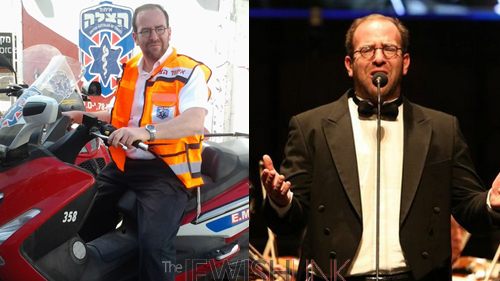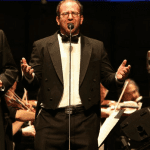
They are a familiar site in Jerusalem and across Israel – United Hatzalah volunteers rushing in their orange vests and red motorcycles to save lives during calls of emergency distress. Each of the 2,100 registered volunteers which include secular Israelis, Ultra-Orthodox, Arabs, settlers, and citizens across the spectrum, carry a defibrillator and necessary medical equipment to treat patients as quickly as possible.
But many volunteers also carry their own stories, leaving behind families, professions and busy lives when the dispatch call arrives. Internationally renowned Israeli cantor, Shlomo Glick of Jerusalem is one of those volunteers. When Glick is not on stage performing with the Israeli Philharmonic Orchestra or singing before international audiences in Berlin, London, New York, and Prague, he is on lifesaving his ambucycle responding to emergency calls in Israel.
The 36-year-old father of six children, who recently performed at the United Hatzalah 10th anniversary concert with other leading chazanim, sat with Tazpit News Agency in an interview about his work as a cantor and an emergency volunteer.
“Haatzalah is always on my mind – I can get a call anywhere and anytime, even in the middle of leading prayer services at the synagogue or recording a cantorial piece at a music studio,” Glick said.
Chazzan Glick recalls one incident when he was recording a cantorial piece at a well-known music studio in Meah She’arim. “In the middle of the song, my mobile-alert goes off. I rushed to a playground nearby, where a mom had called and treated her unconscious baby.”
United Hatzalah utilizes unique GPS dispatch technology to identify the closest and most qualified volunteers to respond to an emergency. This gives volunteers, whose cellphones and motorcycles carry the GPS technology, the ability to arrive on scene between two to three minutes. Glick responds on average to two-three emergency calls every day.
“This Passover, we took our kids on a trip to northern Israel. On the way, I saw a car accident and had to go treat an injured person. My kids know that I have to respond because that’s what dad does,” he explains.
“It’s not easy on the wife and kids – many times I will have to go out in the middle of Kiddush on Shabbat or when putting my children to bed. But one moment can make all the difference when it comes to saving a life,” he told Tazpit News Agency.
“United Haatzalah’s goal is to prevent untimely deaths. We don’t want to say – had we been there, it could have been different,” says Eli Beer, the founder and President of United Hatzalah whose volunteers arrive on scene in less than 3 minutes, filling the time gap between the emergency and the arrival of the ambulance. “Whoever saves a single life, saves an entire world,” he adds, quoting a famous Talmudic adage.
Beer and Glick both believe that their desire to save lives developed from the way they were raised.
“It’s all about education from home – you teach your kids the value of life and that seed grows,” says Beer, a property developer and full-time United Hatzalah volunteer with over 25 years of life-saving experience. Beer was raised in a home where medical volunteering was part of the household. His father was an ambulance driver during the Yom Kippur War and as a young child, Beer witnessed a bus bombing in Jerusalem during the first Intifada and has been on site as medical responder during multiple suicide bombings during the Second Intifadah.
Like Beer, Glick also grew up with a father who volunteered as an emergency medical responder and says that volunteering is a family affair. “My father, 61, still volunteers as an ambulance driver with Hatzalah and so does my brother,” he explains.
“Our volunteers could just go home after work and play golf,” says Beer. “But they don’t. There’s an understanding that there is more to life than just your livelihood and personal gain.”
Glick himself is well-known in the cantorial world. “Sometimes it shocks people to see that Shlomo Glick is the one responding to their call. They’ve seen him in these powerful performances, belting impressive pieces; they listen to his discs, and suddenly he’s in person treating their condition,” says Beer.
“It would be like Bono arriving on a motorcycle to save people on a weekly basis.”
Glick has even found himself singing to a patient while giving him oxygen. “In one incident, as I was treating an elderly man, his wife had asked me to sing her husband’s favorite cantorial piece and that’s what I did. After, he was treated and discharged from the hospital, he couldn’t believe that it was me who had responded first to the call.”
“Some people have said to me that it’s not fitting for someone of my profession to ride a motorcycle and answer the masses. An artist is supposed to distance himself from the public for his image. But that doesn’t interest me,” explains Cantor Glick. “God gave us life and he can take away life. Your image as a musician or whatever profession, isn’t important when you’re saving a human being’s life.”
By Anav Silverman
Tazpit News Agency

